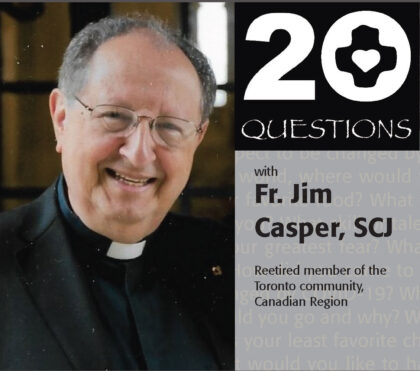 Favorite color? What makes you happy? What are you good at? What is your greatest fear… “Twenty Questions” is a regular feature in which SCJs and those with whom they minister and collaborate share a bit about themselves in an informal Q&A. Participants are given the same list of questions and are invited to answer as many as they would like.
Favorite color? What makes you happy? What are you good at? What is your greatest fear… “Twenty Questions” is a regular feature in which SCJs and those with whom they minister and collaborate share a bit about themselves in an informal Q&A. Participants are given the same list of questions and are invited to answer as many as they would like.
Fr. Jim Casper, SCJ, is a member of the Toronto community (Canadian Region). He is retired, but continues to be active in part-time ministry.
Q: Where were you born and raised? Describe your family.
FR. JIM: I was born in Leamington, a small town of approximately 8,000 people, situated on the shore of Lake Erie, south of the Windsor/Detroit border. My father immigrated from Lebanon in 1925 when he was 16 years of age, arriving in Leamington to join his older brother who had settled there. My mother was born in Windsor in 1918 of immigrant parents from Lebanon. In Leamington, our family was part of a Lebanese immigrant enclave with about eight families forming the nucleus. It was a welcoming, warm, safe and trusted group of relatives and friends who provided the necessary compass and protection for children and newcomers from Lebanon. Both mom and dad had close family members in Detroit with whom we regularly visited. From time to time we accompanied them to the Maronite parish in Detroit, always mysterious and riveting for us children because of the constant sung dialogue between priest and people. I am blessed to enjoy the company of five loving siblings, four sisters and a brother, and I am so very grateful to God for every one of them. We manage to keep in touch regularly as the family grows and grows.
Q: What is your favorite book or movie?
FR. JIM: My favorite movie is Secondhand Lions. Not a popular film, but so beautifully warm and human. It is about a boy who at 13 was dropped off by his unstable mother to stay with his two bachelor uncles. The dynamic set in motion between the youth and the two uncles is absolutely delightful.
Q: If you could travel anywhere in the world post-pandemic – without concern about the expense – where would you go and why?
FR. JIM: I would like to return to Russia. My one visit was introductory and sufficient to whet my appetite for more. I would love to spend more time in St. Petersburg, and see more of the restoration of the palaces and gardens of Peter, and Catherine in the village of the Czars. It would be great to see the Urals and get a taste of Siberia. I am intrigued by the Russian mentality and the way they struggled through the centuries to be accepted and respected by the west. Peter the Great made a huge move by living on the Baltic and pushing to connect with Europe via the Baltic; Catherine the Great made brilliant choices by bringing western art and culture and medicine and philosophy to Russia. I would like to see the evidence of their grand pursuits. Second on the list would be Japan.
Q: What are you good at?
FR. JIM: I think I am good at accompanying people. I am interested in personal stories and I want to be able to interpret what people say by acquiring an understanding of where they are coming from. I have been affirmed as a pastor and teacher. It'[s hard for me to judge; the people whom I encounter tell me in various ways what I am good at and what I am not so good at.
Q: What is your favorite color?
FR. JIM: My favourite colour is deep blue. The thought of it brings me to a quiet place.
Q: Do you have any hobbies or pastimes? If so, what are they and how did you get interested in them?
FR. JIM: I like cooking, gardening, reading, decorating. We take turns cooking in our house and the internet has been a great source of new recipes. My mother was a wonderful cook and enjoyed being creative in the kitchen, especially with baking. We had cream puffs that we made to look like swans, coffee cakes tinted with colour, and with small slits in the pastry revealing nuts and cherries inside. The taste of her apple pie remains unequaled. Grandpa took me along to do gardening with him when I was little so I probably acquired a taste for it through him.
Q: What is your favorite food?
FR. JIM: My favourite foods are desserts with icing, Lebanese food, especially “kibbi nayeh” (ground meat with bulgar wheat and spices) eaten with olive oil and fresh pita bread.
Q: What is your least favorite chore?
FR. JIM: My least favourite chore is cleaning the bathroom and scrubbing floors. But it has to be done.
Q: Who — living or deceased — do you most admire and why?
FR. JIM: I most admire my parents. My father ran businesses for 50 some years with the equivalent of a grade three education and very little English literacy. He was resourceful and able to compensate with his warm personality, humour and bargaining talents. He managed with the help of my mother, who read for him when he “forgot his glasses”. My mother lost her mother when mom was only two years of age; it was a death at childbirth. She gave to us in abundance all the maternal love and care she missed in her childhood. Through her life experiences she acquired wisdom and insights that I admired greatly. She remained alert, fun loving, and retained a broad range of interests even to the end of her life. Her last great gift to us in her 96th year of life was to teach us how to face death peacefully, without fear and with trust.
Q: What would surprise people to learn about you?
FR. JIM: That I can be angry, verbally abusive, and judgemental.
Q: What skill or talent would you like to have that you do not? Why?
FR. JIM: I wish I could swim. I wish I were coordinated enough to engage in more sports.
Q: As a child, what did you want to be when you grew up?
FR. JIM: I wanted to be a priest. I used to celebrate mass with my little sisters and a few neighbourhood kids as the congregation.
Q: What makes you happy?
FR. JIM: I am happy in the company of family members or confreres who share stories of significant life experiences; it is the experience of communion that attracts me. I am happy spending time with a dear friend. I am also happy reading a good book.
Q: What is your greatest fear?
FR. JIM: Becoming blind and deaf, or being prevented from making contact with those I care about most is probably my greatest fear.
Q: What trait or habit do you dislike in yourself?
FR. JIM: Anxiety, lacking in self-assurance, hesitant to speak up.
Q: What trait or habit do you dislike in others?
FR. JIM: I dislike moodiness – not knowing if I will meet Dr. Jekyll or Mr. Hyde at the breakfast table. I also dislike negativity; persistent complaining about others and highlighting the weaknesses of others.
Q: List three words that describe you.
FR. JIM: Cautious, pensive, happy.
Q: How did you come to know of the Priests of the Sacred Heart (Dehonians) and what interested you about them?
FR. JIM: I came to know the community in our minor seminary in Delaware, Ontario. Members of the community taught the whole secondary school curriculum – some talented and natural teachers, others not so capable, but all doing their best. I was very much attracted by their approachability, and the camaraderie among them. I grew to love the lifestyle, the way they shared their faith, not only by including us in much of their prayer life, but also by the informal statements which revealed their relationship with God.
Q: Do you consider yourself a Dehonian? If so, what does that mean to you?
FR. JIM: I think I am a Dehonian. I know that our community has an identity among the parishioners of the parishes in which we minister, but I find it difficult, as they do, to put that into words; whatever it is, I am convinced that I am a part of it. As I age, I have the sense that our Dehonian identity has much to do with an attitude of loving surrender in the encounter with all that life brings us. I think being a Dehonian means accepting the life we are given, with the understanding that it is a gift from a God who, as the founder said with Paul, “… loved me and gave himself for me.” Short phrases from the constitutions are helpful at times, but often become meaningless with repetition. The meaning of being a Dehonian is an ongoing search woven into our lives.
Q: What changes, adaptations or insights do you expect to stay with you from the pandemic? In other words, how do you expect to be changed by COVID-19?
FR. JIM: Adapting to life in a COVID 19 world has had repercussions in every aspect of our lives. I do not believe for a moment that things will “get back to normal.” Life will not be as it was before we, in Canada, went into lockdown on March 7th. I have learned that I really didn’t need the things I thought I needed for life, work, entertainment; and there are different ways of acquiring what I do need. Life can still be good when it is simpler and movement is more restricted. I cannot take health, freedom of movement, ways of meeting and interacting with friends and family – all of these – for granted any longer. I have to be creative in reaching out to others, especially to those whose life has become more economically precarious due to disappearing jobs and the changing of work methods. I have to, at least for now, let go of the Lebanese tradition of hugging and kissing when I visit the family in Leamington.


